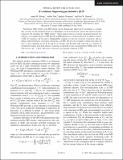| dc.contributor.author | Hoang, Andre H. | |
| dc.contributor.author | Jain, Ambar | |
| dc.contributor.author | Scimemi, Ignazio | |
| dc.contributor.author | Stewart, Iain | |
| dc.date.accessioned | 2011-01-26T14:57:09Z | |
| dc.date.available | 2011-01-26T14:57:09Z | |
| dc.date.issued | 2010-07 | |
| dc.date.submitted | 2010-08 | |
| dc.identifier.issn | 1550-7998 | |
| dc.identifier.issn | 1550-2368 | |
| dc.identifier.uri | http://hdl.handle.net/1721.1/60846 | |
| dc.description.abstract | Perturbative QCD results in the MS̅ scheme can be dramatically improved by switching to a scheme that accounts for the dominant power law dependence on the factorization scale in the operator product expansion. We introduce the “MSR scheme” which achieves this in a Lorentz and gauge invariant way and has a very simple relation to MS̅ . Results in MSR depend on a cutoff parameter R, in addition to the μ of MS̅ . R variations can be used to independently estimate (i.) the size of power corrections, and (ii.) higher-order perturbative corrections (much like μ in MS̅ ). We give two examples at three-loop order, the ratio of mass splittings in the B*-B and D*-D systems, and the Ellis-Jaffe sum rule as a function of momentum transfer Q in deep inelastic scattering. Comparing to data, the perturbative MSR results work well even for Q∼1 GeV, and power corrections are reduced compared to MS̅ . | en_US |
| dc.description.sponsorship | Spain. Ministerio de Educación y Ciencia (MEC) (FPA2008-00592) | en_US |
| dc.description.sponsorship | European Union. Flavianet (MRTNCT - 2006-035482) | en_US |
| dc.description.sponsorship | Banco Santander Central Hispano (UCM-BSCH GR58/08 910309) | en_US |
| dc.description.sponsorship | United States. Dept. of Energy. Office of Nuclear Physics (Grant No. DE-FG02-94ER40818) | en_US |
| dc.description.sponsorship | Alexander von Humboldt-Stiftung | en_US |
| dc.description.sponsorship | Max Planck Society for the Advancement of Science | en_US |
| dc.language.iso | en_US | |
| dc.publisher | American Physical Society | en_US |
| dc.relation.isversionof | http://dx.doi.org/10.1103/PhysRevD.82.011501 | en_US |
| dc.rights | Article is made available in accordance with the publisher's policy and may be subject to US copyright law. Please refer to the publisher's site for terms of use. | en_US |
| dc.source | APS | en_US |
| dc.title | R evolution: Improving perturbative QCD | en_US |
| dc.type | Article | en_US |
| dc.identifier.citation | Hoang, Andre H. et al. "." Physical Review D 82.1 (2010): 011501. © 2010 The American Physical Society | en_US |
| dc.contributor.department | Massachusetts Institute of Technology. Center for Theoretical Physics | en_US |
| dc.contributor.department | Massachusetts Institute of Technology. Department of Physics | en_US |
| dc.contributor.approver | Stewart, Iain | |
| dc.contributor.mitauthor | Jain, Ambar | |
| dc.contributor.mitauthor | Stewart, Iain | |
| dc.relation.journal | Physical Review D | en_US |
| dc.eprint.version | Final published version | en_US |
| dc.type.uri | http://purl.org/eprint/type/JournalArticle | en_US |
| eprint.status | http://purl.org/eprint/status/PeerReviewed | en_US |
| dspace.orderedauthors | Hoang, André; Jain, Ambar; Scimemi, Ignazio; Stewart, Iain | en |
| dc.identifier.orcid | https://orcid.org/0000-0003-0248-0979 | |
| mit.license | PUBLISHER_POLICY | en_US |
| mit.metadata.status | Complete | |
